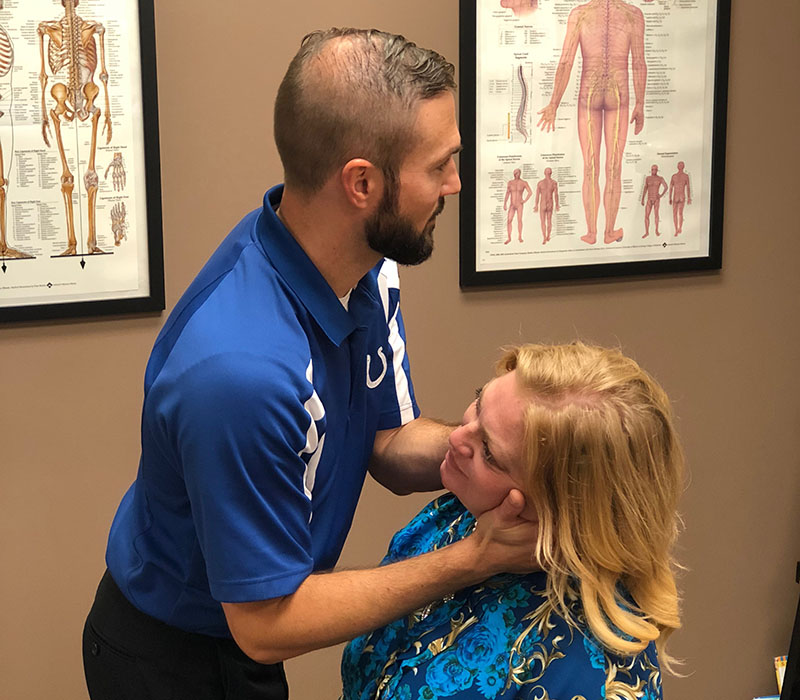What is Chiropractic Care?
 Chiropractic care is a natural method of health care with the proven ability to relieve back pain, increase vitality, and promote well-being. For over a century, doctors of chiropractic have successfully helped millions of individuals recover from spine-related health problems. As a result, chiropractic care has earned its place as the largest drug-free and non-surgical health care profession in the United States.
Chiropractic care is a natural method of health care with the proven ability to relieve back pain, increase vitality, and promote well-being. For over a century, doctors of chiropractic have successfully helped millions of individuals recover from spine-related health problems. As a result, chiropractic care has earned its place as the largest drug-free and non-surgical health care profession in the United States.
The human body possesses a natural ability to restore itself. This ability depends on a healthy nervous system. Life's events such as automobile accidents, sports injuries, repetitive work, and stress are just some of the factors that can overwhelm the body's ability to adapt. The joints of the spine 'lock up' when these events occur, limiting range of motion. Spinal joint restriction and/or misalignment can result in irritation and/or pressure on the spinal nerves. Chiropractic Adjustment can correct these structural distortions, known as subluxations, and restore the body to its optimal form and function.
Local symptoms of subluxations may include pain, tenderness, swelling, tingling, numbness, or spasm around the joints of the spine, back, and neck. Many times these sensations extend further into the shoulders and arms, around the rib cage, or into the hips and down the legs. Subluxations can even lead to headaches, stomach and digestive problems, and loss of overall health. Impaired nerve coordination may cause the whole body to suffer. Vital instructions flow between the brain and the body by way of spinal nerves. These instructions inform and direct the body as to when, where, and how it needs to heal itself. By irritating nerves, subluxations interfere with the essential brain/body exchange, thereby compromising the normal function of the bodies organs and tissues.
Chiropractic Adjustment clears the path for the body to maintain its own health.
Doctors of chiropractic are specially trained in the evaluation and treatment of spinal conditions, which is why an increasing number of back pain sufferers are turning to them for fast, effective, and reliable care. Similarly, more and more hospitals and private practices are now working closely with doctors of chiropractic in order to ensure the best quality of care for patients who suffer from spine-related injuries and dysfunction. The benefits of chiropractic care have also been shown to extend beyond reduction of back and neck pain. In fact, chiropractic has proven itself as useful in the reduction of headache pain, carpal tunnel syndrome, jaw pain, sciatica, and tingling in the arms and legs. The rewards of chiropractic care are numerous. People under chiropractic care report better health and well-being and many families have realized the benefits of chiropractic care for their children.
Nerve interference can affect anyone, which is why people of all ages experience relief and improved health through chiropractic care. A qualified chiropractor will best determine the appropriateness of care for you or your family. No method of health care has proven itself to be more effective than chiropractic in helping those who suffer from back and neck pain. Chiropractors are the most highly qualified professionals in evaluating and caring for these, as well as many other health problems.
YES. Its non-surgical, drug-free approach to health places chiropractic among the safest of all health care practices. Remember, chiropractic care takes nothing out of the body and puts nothing in. As a result, chiropractors enjoy one of the lowest malpractice rates of all health care professionals.
Read more about the Health Benefits of Chiropractic Adjustment.
Like all primary health care providers, doctors of chiropractic undergo extensive education and training before becoming licensed professionals. Students begin by fulfilling undergraduate degree requirements, with a strong emphasis on the core sciences such as chemistry, anatomy, physiology, and physics. The professional program leading to the Doctor of Chiropractic degree is very demanding. Chiropractic students continue their study of the sciences, including pathology and biochemistry, at a highly detailed level. Their education continues into the advanced clinical sciences including orthopedics, neurology, examination procedures, differential diagnosis, and X-ray interpretation. During this entire process, aspiring doctors of chiropractic gain knowledge of the philosophy and practice of health care and chiropractic. Doctors of chiropractic refine their technical adjusting skills in technique classes. During clinical internships student doctors perfect these skills. Finally, all doctors of chiropractic must pass the rigorous national board exams and state exams before entering the field.
Your initial visit will begin with a consultation. Your doctor will take a case history and ask about your present condition. Next, the doctor will perform an examination to evaluate the nature of your problem. This examination generally includes a series of basic physical tests, as well as a specialized chiropractic evaluation of spinal movement and posture. If necessary, your doctor may recommend X-rays or diagnostic tests to obtain further information about the mechanics of your spine and the details of your condition. After completing the analysis, your doctor will explain your problem and map out an appropriate plan of action with you. If necessary, you may be referred to another health care specialist for further evaluation or treatment. Doctors of chiropractic work with a variety of health care professionals in the best interest of their patients. Your doctor will discuss your care plan with you, taking into consideration your health habits, stress, and activity levels. Over the course of your care, your doctor will monitor your individual response and may also recommend changes to your lifestyle, work environment, dietary, and exercise patterns.
Following consultation and examination, a program of care will be designed and customized to your specific needs. This program is centered around the chiropractic adjustment, a method of treatment unique to chiropractic, which corrects spinal subluxations and dysfunction. The primary goal of an adjustment is to improve spinal alignment and motion, thereby relieving nerve irritation, pressure, and pain. You may feel immediate improvement after an adjustment, although most people experience gradual, progressive relief of symptoms. Since adjustments restore motion to previously locked joints, ligaments and tendons begin to stretch back to their normal length. This lengthening may cause slight muscle soreness similar to that brought on by rigorous exercise. If you experience these sensations, be assured that within days you’ll likely be enjoying the benefits of improved spinal motion with less pain that results from a healthier spine. For the best results, follow the plan that your doctor of chiropractic recommends for you.
The number of visits you make to your chiropractor depends on the nature of your condition and your personal goals. Many people use chiropractic as part of a preventive health care routine, scheduling chiropractic appointments on a regular basis to keep their bodies functioning at their best. Others seek care and treatment for specific conditions with the primary goal of treatment being pain relief. It is important for you to discuss your objectives with your chiropractor in order to develop a treatment plan that works best for you. Keep in mind, healing rates vary from person to person. Children tend to respond more quickly to treatment, whereas adults and seniors may respond more slowly. A good rule of thumb is that the longer the spine has not been working properly, the more extensive the care plan may be to achieve desired results.
Chiropractic has demonstrated itself to be one of the most cost-effective forms of care in all of the health care market. As with any product or service, fees vary by provider and location. Many health care plans provide coverage for chiropractic care. Check with your benefits manager to find out what coverage you may have with your health plan. Also, talk with your prospective doctor of chiropractic to learn about your payment options. Many patients pay directly for care, as they discover chiropractic to be extremely cost-effective and affordable.
As members of the Indiana State Chiropractic Association, we advocate that you take a proactive approach to your health. When selecting a health care provider, whether a primary care physician, a dentist, or a doctor of chiropractic, take the time to consult with a few different possibilities before settling on the one of your choice. Evaluate your needs and health care goals. Talk with your friends and family; find out whom they recommend. Then speak to your prospective doctor of chiropractic. A healthy relationship can develop if you two have the same goals in mind.

